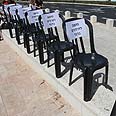
Protest against segregation
צילום: גיל יוחנן
Court: Segregation only upon consent
High Court rules 'kosher' bus lines can continue to serve haredi public, but women must not be coerced into sitting in back. Judges order Transportation Ministry to supervise lines to make sure passengers not being harassed
The High Court of Justice on Thursday ruled in favor of allowing 'kosher' bus lines, in which women and men sit separately, to serve ultra-Orthodox areas.
The court said it would adopt recommendations made by the Transportation Ministry, according to which the segregation will occur only on condition that the passengers agree to sit separately without being coerced, and under tight ministry supervision.
The court ordered the Transportation Ministry to place signs in all 'kosher' buses saying that passengers are free to sit wherever they choose. "Harassing a passenger on this matter may constitute a criminal violation," the signs must say. The ministry must also instruct drivers to make sure the orders are respected.
The court ruling in effect maintains the status-quo currently in existence, in which women do not sit at the front of the bus. It came in response to a petition filed by a group of women and the Israel Religious Action Center (IRAC) in 2007.
Justice Elyakim Rubinstein wrote in the court ruling, "We hope that this verdict will assist, finally, in creating a more proper society which maintains the respect of all its members. We do not know what will be the immediate and long-term effects of this ruling, but we know we cannot accept coerced discrimination against women."
Justice Salim Joubran added, "We hope our verdict will usher in unity, tolerance, and friendship rather than a separation and deepening of rifts in Israeli society."
'Back to days of Rosa Parks?'
The judges stressed that no transportation company can force or even ask women to sit in the back, just as it cannot order them to dress a certain way.
"As I go back and read over these lines I ask myself, how can it be that in Israel of 2010 they have to be written. Have we returned to the days of Rosa Parks?" asked Joubran.
Attorney Einat Horowitz of IRAC praised the judges' decision. "We commend the court's ruling, which determines for the first time that segregation is unlawful discrimination. The verdict supports what is obvious – that every woman is free to choose her seat on public buses and deserving of egalitarianism that respects her choice," she said.
Rachel Azaria, of the Jerusalem City Council, was also pleased. "After a battle that took a number of years, the High Court has accepted our stance – segregated lines are illegal in Israel. As a religious woman I am glad the court supported the values of the Declaration of Independence," she said.
Despite the jubilant responses, however, the petitioners cannot claim a full victory. The rule allowing women to board the bus from the back, which the petition protested, remains in place despite the judges' evident discontent.
"We are aware, and are dissatisfied with the fact that this possibility may facilitate the preservation of 'peer pressure' towards women do not desire this arrangement from within haredi society," Rubinstein wrote. However, he added, he did not see any justification to intervene at this point.
The judge also warned against oppression on the bus lines, recounting incidents in which women who were asked to move to the back of the bus did so in order to refrain from angering the other passengers.
Apparently skeptical about the public's ability to maintain their decision in full, the judges ordered a trial period of 30 days after the Egged bus company had hung the prescribed signs.
During the period, the Transportation Ministry must hold covert and overt inspections to make sure the rules are being followed. In addition, it will have to establish complaint centers for women who feel they have been wronged.
In conclusion, the judges also provide Egged and the Transportation Ministry with another solution. "A central argument raised in support of segregated bus lines is the overcrowding on buses, which leads to congestion and physical proximity," the verdict says. "The bus company and the ministry would be well-advised to pay attention this matter as well."
- Follow Ynetnews on Facebook










